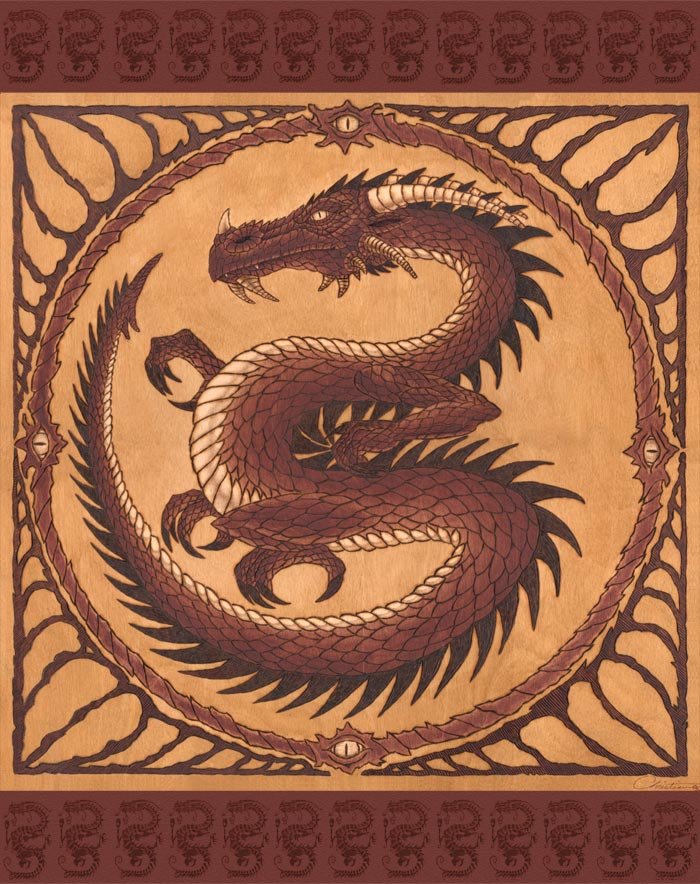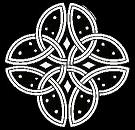 HE HE  LAYER LAYER  ANUAL ANUAL
XIII. THE RELIGIONS
Each person who enters Dragon's Gate has a choice of which, if any, religion they wish to follow, with the following exceptions: Clerics, who must be devoted to a deity,Dragons who don't believe, and Psions who have no need for gods.
There are certain advantages to being affiliated with one of the religions in Dragon's gate, but the amount of "devotion" each person holds to their deity is a strictly personal matter. In other words, some are affiliated with a given religion only for the benefits to be derived, and some are very devout worshippers.
Legend has it that with the disappearance of Death and the instability this action instilled in magick, the gods became less certain of their abilities. Direct manifestations of themselves or their magick, which were once a daily occurrence, are less evident today than long ago. The gods now prefer to work through earthly emissaries more often than they used to. Thus, the power of Clerics have grown to new heights in recent years. By choosing to bestow magickal powers to many pious followers, the gods further increase the bond between deity and worshiper.
Divine Magick
Requires the individual to work magick through the aid of a deity. It has been given to an individual by a deity and functions much like a natural ability. Divine magick does not require arduous study to obtain, it does however, require dedicated worship of a deity. Worship of a deity is easy to accomplish, but meeting the arduous standards and conforming to the rigorous codes ascribed by a god is not. It is for this reason that many worshipers fail to gain even one divine magick spell.
Clergy as well as non-clergy are required to show their devotion to their chosen deity by donating a portion of their money or goods to their temple. Doing so earns favors and allows one to call on divine assistance. This assistance is not always granted, but becomes more reliable the more worthy you become in the deity's eyes. A poor player who donates a higher percentage of his worldly goods than a rich player who donates but a pittance may earn more standing than his richer colleague. When you have accumulated enough favors, you may be visited by the deity who may (nothing is a sure bet where the gods are concerned) bestow another gift. At the very least, you will feel a warm glow from your deity signifying that he is pleased with you.
Favors have 2 important Uses
First, if you are killed in the world, the deity may see your plight and spare you the cost, expense and possible danger of resurrection through the House of the Dead (whose motto is: “over 1 million preserved!” followed by: “pay us!”) or other means. While this will cost you some of your stored favors, it may well be worth it (the House of the Dead will attempt to charge you a fee. If you don't have the funds on you at time of death, they will start confiscating your belongings until their fee [or more] is recovered.) Your god will always step in if you have enough favors stored up. (More detail about the effects of death and DEPARTing in the Life and Death section of this manual.)
Another use for these favors is that they can be exchanged for a boon asked of a temple's clergy. This boon can include full healing, curing of poison, and even resurrection of fallen comrades if you're of adequate devotion level. Be careful not to let your current favors fall to nothing, because then the deity will not heed your call.
Followers of a deity can also call on the god for direct assistance for themselves (or others) in times of dire need. If the deity responds, you will see a symbol of it appear near you. If the favor is granted, you will see the effects of it immediately. This type of divine intervention is very expensive (in favors) and should not be relied on for day-to-day situations. However, characters have been known to get out of the most dangerous situations through their deity's aid.
The Temples ...
Temples. serve as a place to seek solace for members of all classes. Clerics may also TRAIN in the temple of their deity, and are required to DONTATE over and above their regular donations to receive this training. Members of any class can donate to their deity to seek FAVORS, or can RENOUNCE a deity so they might devote to another. Renunciation should be handled with the greatest of care, however, as many deities become very displeased when they lose a follower, and could be angered to the point of harming a former follower. If you choose not to DEDICATE to a god when you first arrive in Dragon's Gate, and later wish to devote to a deity, this is also done at the temple of your choice. Go to the altar and DEDICATE in order to follow a new god.
|
• Elindale •
Elindale is the Goddess of Nature, including animals and the elements. Wildlife, vegetation, weather, and the seasons all fall within her realm of power.
· details ·
|
 |
| |
|
• Odarous •
Odarous is the Deity of Battle and Chivalry. Odarians follow a strict code of battle, based upon valor and fair play.
details ·
|
 |
| |
|
• Rinanni •
Rinanni is the Goddess of Peace, Love, and Knowledge. Rinanni teaches her followers to love, not hate.
details ·
|
 |
| |
|
• Sa •
Sa is the embodiment of all of the processes by which magick functions. The worshipers of Sa worship magick in all its manifestations.
details ·
|
 |
| |
|
• Set •
Set is most often worshipped by the impoverished and the lower class individuals of society, as Set condones and expects his worshipers to acquire goods for the temple through the use of sneakiness and chicanery.
details · Image by Christian Holmes.
|
 |
| |
|
• Taath •
The deity of hate, fear, and ignorance. Taathian history in Aradath, and especially Spur, is long marked with vicious killers, open warfare, and all around treachery.
details ·
|
 |
| |
|
• Unknown •
The temple of the Unknown god is fairly new to the Spur. Many have named this deity, “He who should not be named.” No one has ever seen any manifestation of this Deity,
· details · |
 |
Alignment in Dragon's Gate ...
Before we begin, one thing should be made very clear: The three available alignments do not compare to Good, Neutral, and Evil in any real fashion. Those kinds of moral judgments are very personal in nature, and vary widely from person to person. Also consider that we have many races in play, so what might be considered 'good' to an Arachnian may be considered 'evil' to a Psycian, and vice-versa. In actual role-play, each alignment will likely cross back and forth across the 'morality boundary' as situations change, without invalidating the alignment selection.
Alignment and Role-Play
What your alignment choice represents are some assumptions about how the character views the world and performs everyday tasks. Let's discuss the outlook of each alignment in turn:
Order: (World picture: Redundancy, changelessness, structure)
An Orderly person tends to have a strict set of rules they live by, and once established in a particular way of doing things, will always attempt to resist change, unless of course, it is hazardous to their health. These people tend to be organized, trustworthy, and keep their word. They usually have a high regard for life, their own as well as others, and will try to help if they can (unless it interferes with their own survival, or is a punishment for violation of a rule). They are very respectful of authority, law, self-discipline and honor. Justice is also prized, but only within strict rules of conduct. Some have been known to ruthlessly slay those who do not follow their beliefs, or inadvertently break a rule. Being good workers and organizers, these folks work well in highly structured groups, especially when doing repetitive tasks. Although limited creativity is accepted, they tend to fall back on old beliefs before considering a new approach.
Chaos: (World picture: Innovation, destruction, creation)
Chaotic folks tend to be those 'rebels' who have little respect for laws, authority, and/or those who would try to impose restrictions. Many times they will be the happy-go-lucky people who take one day at a time, and tend to be very much self-motivated in their actions. They tend to be loners, but will work with a group if they think it will be profitable, or will serve some other desired purpose (assuming they have free will to interpret how they wish to involve themselves). They tend to be very creative, always coming up with new ways to do old things. Most chaotics wish to see change happen immediately. The more miscreant types may lie, cheat and steal to their own profit (or if they feel it necessary), but this isn't true of all chaotics. They tend to value life and freedom (especially their own), but may not help someone without some ulterior motive (even less likely if it may endanger them in the process). Most would not give a second thought about killing someone who attempted to restrict their freedoms.
Entropy: (World picture: Balance, natural harmony)
Those who follow entropy are those who desire a perfect balance of order and chaos in their environment. They tend to stay aloof and distant, often in study or other enlightening pursuits, unless threatened or angered. They tend to be 'thinkers', not 'doers', but do make good leaders since they are good at decision-making. In general, these people are respectful of authority, laws, and rules, but only if they agree with the tenets involved, and assuming they aren't overly restrictive. They aren't very warlike, but have been known to fight (and die) to 'keep the peace' when necessary. Followers of entropy are not afraid of death, knowing that it is part of the way of things, and assured that their passing makes way for a new life in the world, thus promoting the continuance of the cycles of renewal and growth. Being unafraid of death, they do not hold any special value in life, and will use any force they deem appropriate to meet an end, including genocide if they feel there is no alternative. However, they value freedom of choice, and will often try to make a settlement before passing judgment on taking the life of another.
Alignment and Worship ...
Alignment also relates to the relationships between the characters and their deities. Deities tend to look for followers who maintain similar belief structures as themselves, and vice versa. It is not unheard-of for a deity to have followers of varying alignments, but the bond is usually closer to those most similar.
Gods of Order
tend to be gods of law, discipline, and knowledge. Many of their followers are Mages or other Sage-like types with a foundation of structured learning. They have also been known to launch 'holy wars' to spread the dominion of their gods. Worship of these deities usually requires formal religious observation and rituals. Sacrifices and/or tithing are often required as well.
Gods of Chaos
tend to be gods of destruction and creation. They often attract followers who wish to bring about great change, and those who seek great power or riches. Worship of these gods does not follow any established form, usually the form of worship being up to the follower. Sacrificing slain enemies, and/or tithing a portion of income are commonly practiced in one form or another.
Gods of Entropy
tend to be gods of nurturing, nature, and balance. Their followers tend to be those who believe in the natural flow of things. 'What will be, will be' is often heard of them. Their worship usually consists of renewing lost resources (like maintaining forests or libraries, farming, childbearing, etc.), occasional rituals, and following the natural order of things. Tithing and/or sacrifices are usually not emphasized, except when necessitated by special need or war. Followers of these gods are usually expected to make some kind of lasting contribution to their environment, usually in the form if something that lasts beyond their lifetime.
|